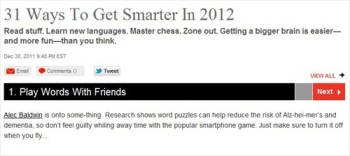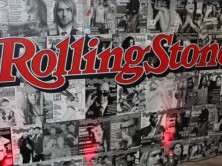
The Daily Beast's "31 Ways to Get Smarter in 2012" (Credit: the Daily Beast, screenshot)
The New York Post slammed Newsweek/Daily Beast earlier this month for an article titled “31 ways to get smarter in 2012” that the Post said basically serves as an advertisement.
According to the New York Post’s Jan. 3 article, the Newsweek/Daily Beast feature is “downright idiotic” and a “dismal demonstration of product placement” with “commercial-friendly tips”
The Post’s concern was over the name-dropping in the Newsweek/Daily Beast article (see here). While not all tips scream product placement (like #12: Join a Knitting Circle or #2 Eat Turmeric), others, like “#1: Play Words with Friends,” (a free game app) and #22 “Visit MoMa,” do promote a single product or place.
We wrote to Newsweek/Daily Beast asking for comment on the New York Post’s calling this an example of product placement and asking if marketing or product placement had any role in the list.
Newsweek/The Daily Beast’s public relations director, Andrew Kirk, told iMediaEthics by e-mail that:
“Products, apps and tools cited in Sharon Begley’s feature 31 Ways to Get Smarter – Faster in the January 9th 2012 issue of Newsweek were chosen via editorial research. There was no commercial product placement involved in making the picks. “






Comments Terms and Conditions